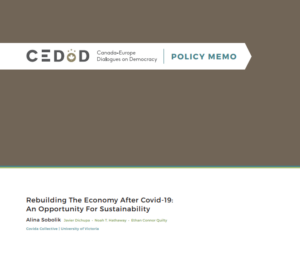Rebuilding the Economy After Covid-19: An Opportunity for Sustainability
by Alina Sobolik, Javier Dichupa, Noah T. Hathaway and Ethan Connor Quilty (Covida Collective) of the University of Victoria
The novel Coronavirus or COVID-19, originating in Wuhan, China, has had an unprecedented effect on both the global economy and environment. Pollution levels over China and Europe are being reported at record lows. “Not even during the Great Depression and World War II did the bulk of economic activity literally shut down, as it has in China, the United States, and Europe today.”1 The United States stock market experienced its fastest decline in history (20% from its peak) within a period of 15 days.2 So far, state responses and recommendations have focused on restarting the econo-my and advancing cautiously, yet swiftly, into what is being termed a ‘new normal’. Along these lines, several govern-ments have rolled out stimulus packages in order to keep the economy moving while adapting to social, political, and economic life in times of pandemic. Nevertheless, in this great reconstruction, governments seem to be ignoring the opportunity of reactivating economic life while also addressing another important emergency the planet is fac-ing, the climate crisis. Following from this, I argue that this crisis could be an opportunity to reactivate the economy in a manner that addresses both the pandemic and the climate crisis through a re-imagining of our economies as circular and no longer relying on infinite growth.


